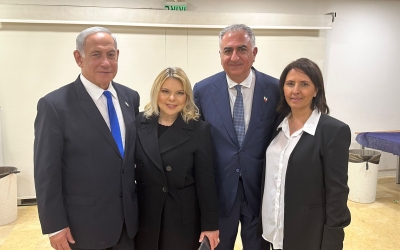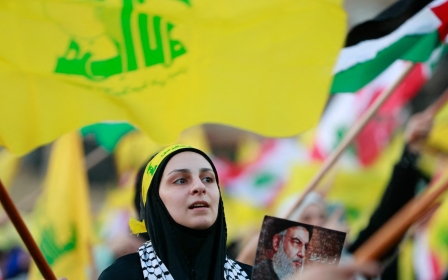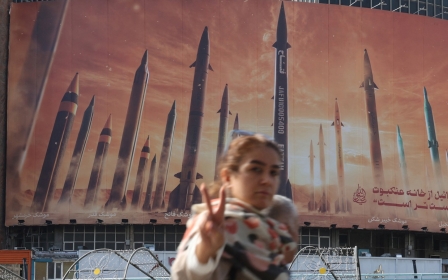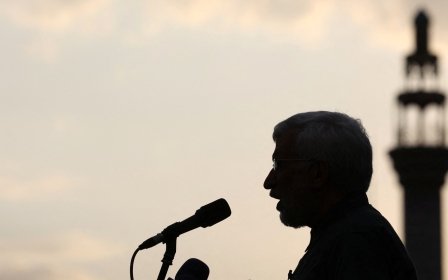How genocide in Gaza marked the death of Iran's expat opposition
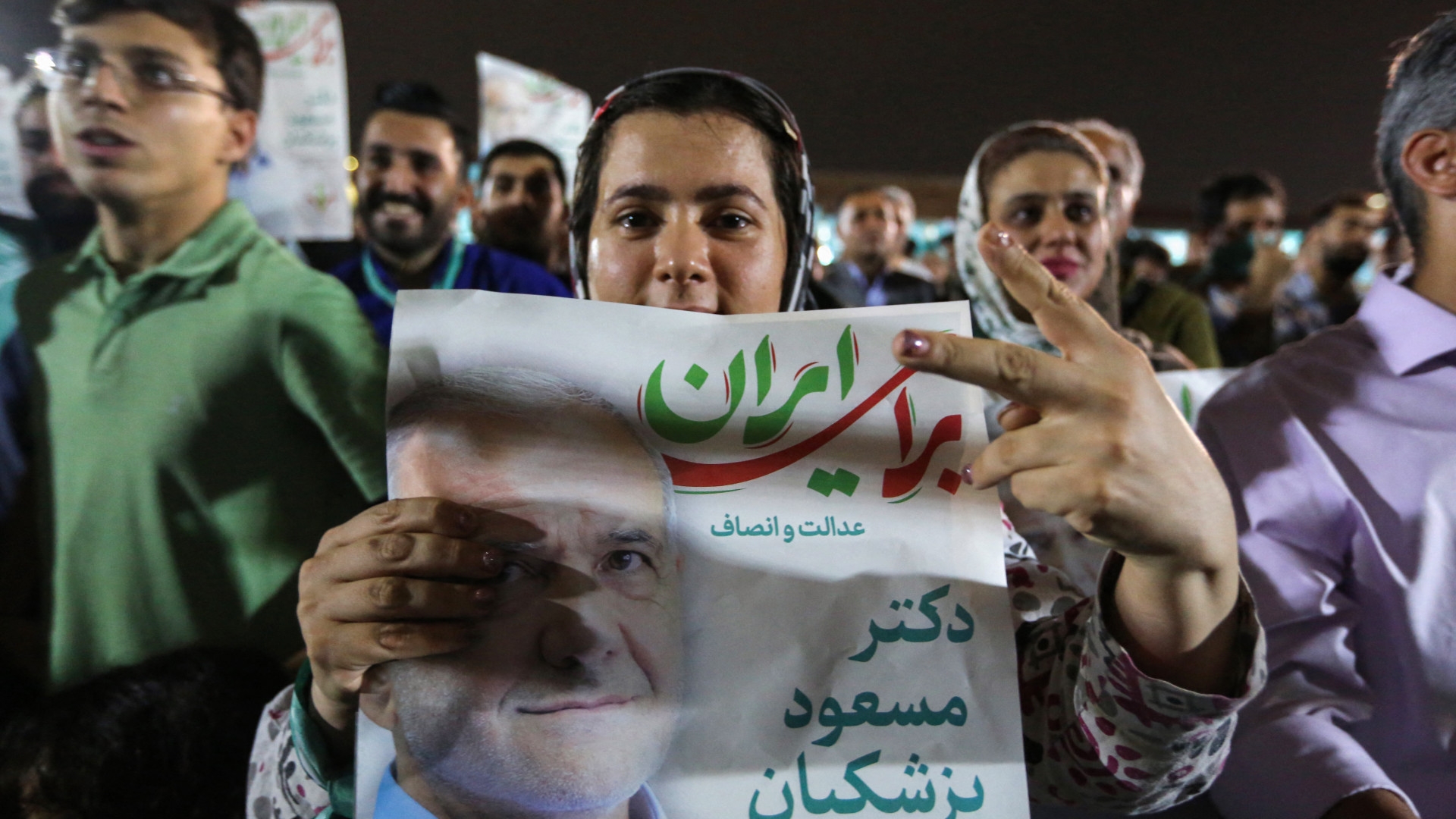
The continued Israeli genocide in Gaza and the rest of Palestine has far-reaching implications for the world at large, but for the region in particular.
We can no longer understand any aspect of the region's geopolitics or the domestic politics of individual countries in terms that were previously meaningful or even legitimate.
If Jordan joins the US in defending Israel against an Iranian missile attack at a time when Israel is committing genocide in Gaza, if Egyptian authorities arrest pro-Palestinian demonstrators protesting against the same genocide, or if Egypt, United Arab Emirates and Jordan are increasing their trade with Israel, then the entirety of the Arab and Muslim world will have to be understood in radically different terms.
As I write, Iran is once again gearing up for another presidential election, following the sudden death of President Ebrahim Raisi on 19 May in a helicopter accident.
In yet another lacklustre spectacle, six candidates - five staunch conservatives and one wobbly reformist - have been cleared by Iran's Constitutional Council to join the fray. They have since engaged in one television debate after another, addressing domestic and foreign policy issues in a gaudy pantomime, feigning democracy.
New MEE newsletter: Jerusalem Dispatch
Sign up to get the latest insights and analysis on Israel-Palestine, alongside Turkey Unpacked and other MEE newsletters
The Iranian presidential election is characterised by similar, if not identical, banalities to those we see elsewhere in the world.
The supreme power remains with the supreme leader, an anomaly of any democratic rule, and Ayatollah Ali Khamenei will remain a lifelong leader.
What hope for real democracy can exist in Iran or anywhere else in the region at the mercy of the US, Europe and their favourite garrison state?
Yet with a quick look at Palestine, Lebanon or Syria - all at the mercy of Israeli savagery, left and right - one must be grateful that some 80 million Iranians go to bed each night and wake up without their houses being bombed over their broken bones and dead bodies.
For sure, that is a low bar for a restless nation afflicted with the endemic corruption and incompetence of its ruling elite.
But what hope for real democracy can exist in Iran or anywhere else in the region at the mercy of the US, Europe and the barbarism of their favourite garrison state? Their favourite political order is a corrupt military junta like the one in Egypt that will serve western interests.
Fake expat opposition
There is absolutely no hope from outside Iran, either.
Soon after the rise of the most recent social movement in Iran, dubbed "Zan, Zendegi, Azadi" (Woman, Life, Freedom), a group of expat opposition figures emerged from their luxurious hiding places and rushed to assume centre stage.
Chief among them was Reza Pahlavi, the son of the late deposed Shah of Iran, who likely wanted to give a semblance of meaning to his life by presumably "leading" the movement.
Such figures were, of course, delusional. But that did not stop leading liberal outlets in the US media who sought to engineer an Iranian version of Ahmed Chalabi from their mismatched cacophony.
It is not an exaggeration to say that the entire production of the so-called "Iranian opposition" in the US is a case study of fake news on steroids.
Their proudest product is journalist Masih Alinejad, an Iranian opposition talking head seemingly manufactured entirely by the US media.
Instrumental in promoting these expat figures to centre stage were not just mainstream outlets. Neoconservative publications with a patent or latent Zionist agenda are eager to continue to demonise the ruling regime in Iran, not on behalf of any struggle for democracy inside the country, but on behalf of the US-Israel alliance.
They seek to weaken and dismantle the Islamist regime and make it more Israel-friendly.
Such barefaced chicaneries have not only failed to help the legitimate social uprising inside Iran - they actively discredited it. The movement inside Iran was entirely grassroots, legitimate, and triggered by the death in custody of a young Kurdish-Iranian woman, Mahsa Amini, and had absolutely no organic link to any one of these frightful figures barking from the US and Europe.
Things have now changed radically. The ongoing genocide in Gaza is a game-changer, a transformative event in world and regional history. Nothing will ever be the same.
The entire history of European colonialism that had created the criminal enterprise of Zionism and stole Palestine as its garrison state is now in full view of world history - with tens of thousands of Palestinians slaughtered by Israeli soldiers and their American and European weapons.
There is no national liberation movement from tyranny anywhere in the world that can be aloof from where the pulse of world history is beating - and that pulse today is beating in Palestine.
If the leading figure of an expat opposition actively sides with Israeli genocide in Palestine, then that entire cause has forever lost its legitimacy.
The key figures in Iran's expat opposition are either active Zionists like Reza Pahlavi and Alinejad or they are people who consider Palestine irrelevant to their cause.
A monarchist historian of this opposition spectacle recently published a piece more than six months into the war on Gaza without a single word about the Palestinian genocide.
Indeed, this pathological fixation on the phoney Iranian expat opposition comes at the cost of total ignorance or dismissal of the global outrage against the settler-colony.
'Islamophobic banality'
Reactionary monarchists are not the only party lost to our current history.
Significant factions of the Iranian left are equally plagued by a chronic Islamophobia afflicting their perception of Palestinian national liberation.
Their legitimate opposition to the ruling regime in Iran has now degenerated into a pathological hatred of Islam, and they use the word "Hamas" precisely as the Israeli propaganda machinery dictates it, entirely ignorant of the multifaceted nature of Palestinian resistance.
What will remain constant in Iran is the desire for a free and democratic future that may or may not ever come
The genocide of Palestinians in broad daylight is now a matter of global consciousness by virtue of the historic documents that South Africa has submitted to the ICJ and the report of the UN Special Rapporteur Francesca Albanese, "Anatomy of a Genocide".
These historic texts and the genocide they document have now exposed Zionism for what it has always been: not a friend of any democratic uprising anywhere in the world, but an enemy of any ruling regime that has failed to endorse the Zionists' wholesale armed robbery of a people's homeland.
There can never be any democratic uprising anywhere in the world without active, open and principled solidarity with the Palestinian cause and steadfast opposition to the settler-colony and its successive acts of genocide.
The pathetic and disgraceful Iranian opposition, manufactured in the US and Europe, has forever failed that test of credibility.
The expat characters will no doubt continue with their parasitic lives outside their former homeland, and remain equally irrelevant to the fate of the nation to which they lay a false claim.
What will remain constant, and awaiting yet another round of outbursts in the near or distant future, is the desire (and despair) for a free and democratic future that may or may not ever come.
Yet its glittering hope will never leave this nation or its ruling state to remain at peace.
The views expressed in this article belong to the author and do not necessarily reflect the editorial policy of Middle East Eye.
Middle East Eye delivers independent and unrivalled coverage and analysis of the Middle East, North Africa and beyond. To learn more about republishing this content and the associated fees, please fill out this form. More about MEE can be found here.



